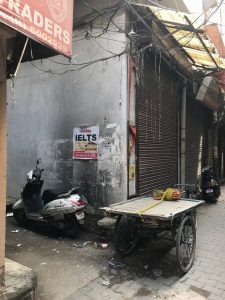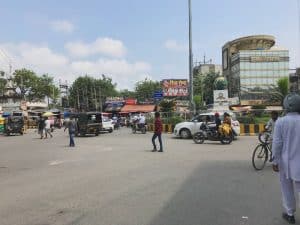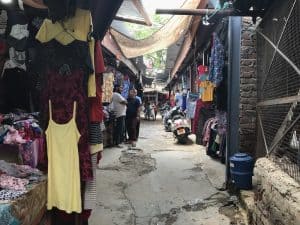We were sitting in one of the clothes vendors’ shops in Sudama market. He knew us well and each time greeted us with tea and articulate conversations. That day however his son was sitting there and as before invited us for tea. While we were talking his friend came with an envelope postmarked from the Canadian embassy. It was his answer to whether he would be able to attend a family wedding. We waited in anticipation as the young men opened the envelope, to reveal that his visa had been denied. The disappointment was evident in both faces. They had planned to emigrate to Canada or Australia, or even to S. E Asia (Malaysia or Vietnam) and undertake a hotel internship. Now they would have to wait longer and spend more money trying for visas before this dream could be realized.
Everyone we speak to in Jalandhar has a family member abroad. Everyone, irrespective of class, religion or caste, has a son or daughter, or uncle or cousin or a relative living and working abroad – Canada, Australia, USA, UK, Singapore, Malaysia are the most common places. As a city, Jalandhar exudes its transnational connections visually – we are hit by signs offering Visa services, IELTS exams, emigration advisors and remittance outlets.
These transnational connections are not unique. Jalandhar was made by the influx of migrants from surrounding villages and from the regional state of Gujarat. The British colonial state bypassed the ‘messy and chaotic’ city building a cantonment town with neat and ‘orderly’ streets in its peripheries. Its legacy of transnationalism was cast particularly violently when the British left in 1947. As Muslims left Jalandhar to emigrate to Pakistan, their empty houses and Havelis were taken over and allocated to incoming Hindu refugee families coming from Pakistan. The failure of the green revolution, agrarian crises, the collapse of industries and employment, militant insurgency in the 1980s and more recently the influx of drugs and alcohol into Punjab brought more migrants into Jalandhar only to find that Jalandhar, too, is part of these bigger challenges.

IELTS coaching centers are dotted across the city catering to those aspiring to move abroad. Pic: Ayona Datta
Nowadays, Jalandhar exudes its transnational connections with pride, standing as a city transformed by remittances and cultural exchanges between NRIs (Non-Resident Indians) and their families. Dotted across its demure peripheries, are sudden incongruous juxtapositions of postmodern architecture and agrarian lifestyles. Indeed one structure that stands out – Bath Castle — is a full-fledged castle built as an amalgamation of English turrets and Mughal arches! These are part of an emergent landscape of over-the-top event venues, particularly weddings organized by and for the huge NRI population which has emigrated across the world, who regularly send remittances, sponsor family members and have radically changed the social and built landscape of Jalandhar in the last few decades.
Jalandhar: A Smart City in the future?
When Jalandhar was selected as one of the 100 smart cities, one of its pan-city proposals was to implement a ‘Chowk [junction] improvement’ project across the city. As a city with as many as 11 roundabouts chosen for transformation into smart chowks, the city’s desire to ‘improve’ junctions however was not new. Plans to widen the chowks to speed up traffic were found in the Jalandhar Improvement Trust archives.
The new smart chowk proposals sought to speed up traffic in order to make it flow faster, by removing the roundabout structures (often with statues of important personalities), install new CCTV cameras and link these to feed into a Command and Control Centre. One of these – Jyoti Chowk was the site where the largest numbers of vendors were located who would be affected by these improvements. These vendors have been trading in the city for at least two generations; some of the third generation have also begun to engage in vending to support their parents.

Jyoti Chowk is one of the 11 chowks chosen for improvements as part of the smart cities project. Pic: Ayona Datt
Sudama Market has a precarious position within the smart city proposals. It includes three markets with different degrees of precarity – the fruit and vegetable market with several stalls allotted to those who volunteered for state sponsored vasectomies during the Indian emergency of 1977-79, the clothes market established by male migrants from across Punjab and the second-hand clothes market established by women migrants from Gujarat.
The second-hand clothes vendors feel most vulnerable since their right to trade there is continuously challenged by the municipality. The market itself has been through two raging fires in the last 5 years, when their entire stock was burnt down with their stalls. The vendors rebuilt their shops, bought more stock and persisted in providing both rich and poor urban citizens with fresh food and clothes. There have been proposals over the years to remove and relocate them to other parts of the city, which they have resisted. Yet they understand that relocating may be inevitable in the near future.

Sudama market comprises three smaller market – fruits & vegetables, clothing and second-hand clothing. Pic: Ayona Datta
Trade in the market is built upon a range of transnational connections produced and sustained by the vendors. Most of them have visited their NRI families and have become familiar with fashion trends abroad. They source their stock both nationally and internationally. The second-hand clothes often come from Delhi’s Azad Market; the new clothes are shipped from as far as Dubai, landing as far south as in Kerala’s ports in shipping containers, which are then brought by road to Jalandhar in North India. Vendors are continually on the lookout for new transnational supplies which would be attractive and affordable to customers and thereby boost sales.
A ‘Minor’ Setback
For the younger generation of vendors, the market is only a form of ‘timepass’, a way to support their parents while they wait for emigration opportunities. Our vendor’s son tells us that every young person in Jalandhar wants to leave. Drugs and unemployment in the Punjab have disillusioned the youth and they do not see vending as a long-term future. ‘Visa denied’ is a minor setback. In the long-term they will all emigrate.
Hotel management seems to be a popular route to initiate their transnational journeys. It is cheaper to study, and easier to find jobs. Internships we are told are the fastest routes to employment. His cousin in Canada has been working for a year and has already bought a car and sending remittances. Jalandhar offers nothing for young people, he says.
The desires and imaginations of a smart city are intimately experienced by the vendors and their children in Sudama market. The proposals for improving the chowk are not seen as smart. They have been struggling for a long time to establish their right to trade there through a combination of judicial processes and street protests. For the vendors, a smart city is one with basic infrastructure – fire-proofed buildings, unblocked drains, improved water supply and public toilets; and a right to trade where the trade was profitable – in Sudama market. Basic infrastructure and the survival of Sudama market is what makes a city smart, they argued. And they continue their fight to trade in the chowk.
For the young men, there was no hope for the future. Disillusionment and a wider global consciousness larger than what their parents were exposed to has convinced the younger generation of vendors that there would never be a ‘smart’ Jalandhar. The young man tells us – ‘Jalandhar ka kuch nahi ho sakta [nothing can be done of Jalandhar]. If you want to stay here, you have to be like Gandhi’s three monkeys – See nothing, hear nothing and say nothing’. Smart Jalandhar as they understood, was impossible. The smart citizen they say is one who is successful in their efforts to emigrate.
[This post has been republished from the author’s blog with permission. The original can be found here.]